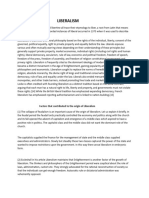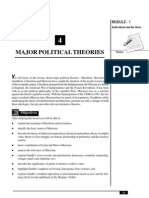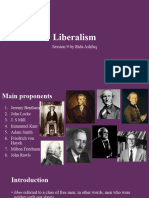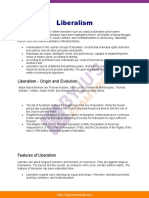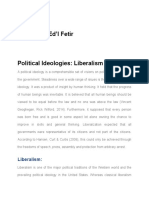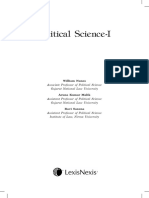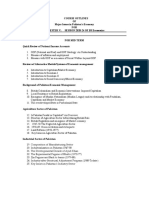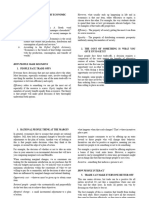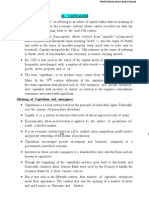Political Ideologies Explained
Uploaded by
Oshin GuptaPolitical Ideologies Explained
Uploaded by
Oshin GuptaM3
30 October 2023 10:47 PM
MODULE 3
Political Ideologies
3.1. Liberalism
3.1.1. Meaning and Definition
Shift from Negative Liberty to Positive Liberty (Classical and Modern Liberalism)
3.1.2. J.S Mill views on Liberty – Influence on Indian Constitution
3.2 Utilitarianism
3.2.1 Meaning and Definition, Basic Principles, Arguments in Favour and Against.
Jeremy Bentham’s Views and J.S Mill’s Modification of Benthamite Utilitarianism
Comparison to Sarvodaya (Specified)
3.3. Socialism
3.3.1 Meaning and Definition, Basic Principles, Arguments in Favour and Against.
Influence on Indian Constitution
3.4. Communism
3.4.1 Basic Principles and Evaluation of Communism
3.4.2 Comparative Study of Socialism and Communism (Specified)
3.4.3 Comparative Study of Gandhism and Communism (Specified)
LIBERALISM
Meaning and definition
a political and social philosophy that promotes individual rights, civil liberties, democracy, and free enterprise.
Elements of Liberalism:
Liberalism has been branded by many as meta-ideology which means that it encompasses many principles, values and elements within its fold. Whereas other ideologies do
not possess this capacity. The following are the main elements/principles/values of liberalism—Individualism, freedom, reason, toleration, consent, constitutionalism, equality
and justice.
1. Individualism:
Individualism is the central idea or theme of liberalism. It believes that the interests or welfare of the individual should be given primacy over all other values and principles.
Individual is the basic concept of political theory and arrangements shall be made to safeguard his interest. Liberalism says that since a political system consists of individuals it
should be the chief objective of this system to see that their interests are fully protected and the individuals are quite capable of doing their own job. The role of the state is to
some extent like a night watchman.
This conclusion is based on certain presumptions such as they are reasonable and do not harm others. They are capable of pursuing their own interests and outside
interference will not produce any benefit. To reach the goals (the development of individual’s personality, protection of interests, allowance of freedom etc.) it is essential that
the society is to be restructured suitable for people.
It has been suggested by liberal thinkers that establishment of market economy, curtailment of state authority to the minimum level, non-governmental organisations must
have maximum freedom to operate etc. The liberalism believes that all these are indispensable for the development of the latent qualities of the individuals. That is why it is
frequently said that the primacy of the individuals is the core of liberalism or liberal political philosophy.
2. Freedom:
Another important core value, principle or element of liberalism is freedom. To the liberals it is the value of supreme importance because without it the individual will simply
be a unit without any dignity. Moreover, liberty or freedom is the best vehicle for developing the best qualities. But the liberals do not advocate for absolute or unrestricted
freedom because freedom/liberty will do more harm.
They are in favour of chained or restricted liberty. J. S. Mill (1806-1873) was the pioneer of individual liberty but he favoured the association of law with freedom because he
believed that restriction is for the general welfare of the community. The famous British historian Isaiah Berlin (1909-1997) developed a famous concept of liberty which states
that liberty/freedom has two concepts—negative and positive.
The negative liberty implies that man should be allowed to enjoy an atmosphere free from all sorts of restrictions. This was the contention of classical thinkers. But modern
liberals do not think of liberty where there shall be no restrictions. It is positive liberty because real liberty is one which implies laws and restrictions.
3. Reason:
Liberalism harbours upon reason. To put it in other words, liberalism and reason are inseparable from each other.
This relationship can be viewed from angles more than one:
(1) Mention has been made earlier that liberalism partially the product of Enlightenment which strongly emphasises that man is rational being and guided by reason and
rationality. The advent of Enlightenment emancipated man from age- old superstition, ignorance and bondage. Enlightenment also established the age of reason.
(2) Since individuals are rational and reasonable they are quite capable of taking any decision and to judge what is good and what is bad for them. In that case there is no
necessity of imposing any decision by any outside power/authority.
(3) The liberals believe that real progress of society could be achieved only through the individual initiative and outside interference will dampen the spirit of initiative.
(4) The primacy of reason ultimately led Adam Smith (1723-1790) to enunciate a doctrine of laissez-faire. A large number of philosophers and thinkers enriched the various
aspects of Enlightenment through their philosophy and ideas. Enlightenment in all possible ways gave priority to reason and rationality. “Rationalism is the belief that the
world has a rational structure and that this can be disclosed through the exercise of human reason and critical enquiry”.
4. Toleration:
Toleration is another value/element of liberalism. In any society there is found different opinions, religious sects or communities of belief and faith. All of them must live side
by side peacefully and for this is required toleration. Also various ideologies and opinions make a society diverse. It is the basic feature of any society. Liberalism believes that
all these diversities must exist side by side.
One community/section has no right to impose its decision or belief of another. Only in authoritarian community imposition of ideas and belief happens. On the other hand,
liberalism attempts to accommodate all the beliefs, faiths, ideologies and opinions. Lord Ramakrishna very frequently said many are the opinions and many are the ways.
The noted French philosopher Voltaire (1694-1778) once said “I detest what you say but I will defend to the death your right to say it”. This opinion of Voltaire clearly shows
that he forcefully advocated for the practice of toleration. Massacre of St. Barthalomew (1572) is the manifestation of the most hated type of in toleration.
Not only this massacre, numerous other events took place in various parts of European society and they were definitely black spots of society. What liberalism wants to
impress upon us is that toleration ought to be practised by all sections of body politic and if it is not done the progress will be adversely affected which will be a loss for whole
humanity.
5. Consent:
Consent is another value/element of liberalism. The idea of consent though very old, its modern appearance took place in the hands of the contractualists, such as Thomas
Hobbes and John Locke. Both of them assertively argued that the members of the state of nature assembled together to take a decision about the setting up of a body politic
Pol Sci 2 Page 1
Hobbes and John Locke. Both of them assertively argued that the members of the state of nature assembled together to take a decision about the setting up of a body politic
and behind this decision there was the consent of all. Locke dealt elaborately with consent and this was one of the pillars of his liberalism.
The freedom fighters of America raised their arms against the British rulers and said that they had no consent behind British rule in America. We hold the view that consent is a
very important element of any democratic government and this has been variously explained by many in numerous forms. It is generally held that representative form of
government is the most popular embodiment of consent. J.S. Mill was a great defender of government based on consent.
The liberal thinkers even go a step ahead and declare that every law and policy must be based on the consent of those for whom these are made. In this way consent has
become an integral part of democracy and liberal political philosophers are of the opinion that all forms of pluralist societies (also liberal societies) must start from below. That
is, consent of all or majority must constitute the basic structure of society.
6. Constitutionalism:
Constitutionalism is an important principle/value/element of liberalism. It has two meanings—narrow and broad. In its narrow meaning constitutionalism means certain
limitations upon the government specified by constitution. The narrow meaning further states that whenever a government intends to discharge any function or adopt a policy
it must follow the restrictions.
In broader sense it implies values, principles and ideas which act as guide to the government. Whenever the government proceeds to some work it must implement these
values, principles, ideas etc. The objective is to give proper credence to the aspirations of the people and to translate them into reality.
Constitutionalism is a basic principle of liberalism. It, in simple language, states that government’s business never specifies that it has the unlimited freedom to do anything
without considering the advantages or disadvantages of the common people. It must follow certain basic rules and procedures laid down in the basic or ordinary laws.
Needless to say that this idea was first formulated by Locke and in the later periods it was adhered to by many. This is called constitutionalism or liberation. We can further
state that constitutional principles must be observed by both the rulers and the ruled and none has the authority to act arbitrarily. The arbitrariness and constitutionalism are
the issues situated at two opposite poles. Constitutionalism is another name of limited government or the theory of limited state.
7. Equality:
Liberalism is based on another principle and it is equality. Though we treat it as a political principle/value it is also a religious and moral principle because the religious- minded
people generally say that every person is born equal as Rousseau said man is born free. So it is unreligious to deprive him of his equal status with others.
The religious people also believe that it is never the intention of God to create inequalities among men and if an artificial distinction is created among men that will go against
the will of God and in that sense it is immoral. We can further observe that as a political ideology liberalism has also built up a nexus with religion.
But liberalism is also an ideology of practical world. In any society all the individuals cannot claim same levels of merit, intelligence and capacity of hard work and in that case
there must arise clear differences in remuneration. This must be admitted. Idleness and hard work cannot be equally remunerated and if done so that will make way for the
appearance of gross injustice. None will be ready to demonstrate his ability.
This type of social inequality does not infringe upon the concept of equality. Equality as a principle in political science asserts that none will be allowed to enjoy special
privileges ignoring the common minimum privileges to which everyone has legitimate claims.
8. Justice:
Though justice is a principle of both socialism and liberalism, the latter gives it more importance and politically declares that the very basis of liberalism is justice. The liberal
justice has several forms or meanings. We note few of them. It is the declared policy of liberalism that each individual will have his due share and since all men are born equal
none can deprive other of the share.
All the persons have same status in society and there shall be an atmosphere so that people can enjoy the status. “Liberals, fiercely disapprove of any social privileges or
advantages that are enjoyed by some but denied to others on the basis of factors such as gender, race, colour, creed, religion or social background. Rights should not be
reserved for any particular class of persons. The most important forms of equality are legal equality and political equality”. Liberal conception of justice further draws our
attention to the point that the door of opportunity shall be open to all.
Everyone will get the chance to have a share of opportunity. Liberalism also speaks of social equality. All these interpretations lead to the liberal conception of justice. It also
says that talented and non-talented persons are not to be grouped together. In this political ideology there is a special place of talents which means that merit should be
recognised and should be given its due share. It is called meritocracy.
Classical liberalism
The political foundations of classical liberalism root in a series of social changes from the sixteenth century. The late Medieval saw the dissolve of
feudalism and the rise of absolutism. Meanwhile, the power of papacy was weakened and religious reformation was seen in European countries.
Rulers had to enforce the conformity either to Roman Catholicism or Protestantism. This process triggered conflicts within and among the states.
One example was the Thirty Years’ War from 1618 to 1648, which brought Europe an enormous damage. In the next century, as industrialization
gained pace, a new social class, namely the middle class emerges. They yearned for more political participation and economic freedom. These
factors triggered the revolutions in the seventeenth and eighteenth century, the most notable of which were the Glorious Revolution in England in
1688, the American Revolution from 1775-83, and the 1789’s French Revolution. In this circumstance, liberalism gradually emerged as a political
doctrine. In the light of the philosophy of English liberals John Locke , French political philosopher Montesquieu , and even earlier the individualism
of Thomas Hobbes , early liberals aimed at restricting the power of the government over individuals. In the word of UK-born political activist and
pamphleteer Thomas Paine, the government is a “necessary evil”.
Opposing feudal privilege and absolutism, liberals emphasize the importance of constitution and a representative government. The structure of a
minimum government was supplemented by Montesquieu. He designed a mechanism of check-and-balance by advocating the separation of three
power of the government: legislative, executive and judiciary. Classical liberals, such as Locke also asserted that private poverty is the foundation
of liberty of individuals. Another crucial element of classical liberalism is economic liberalism. This principle was mostly provided by Adam Smith in
The Wealth of Nations. In a word, classical liberals advocate Laissez-faire, believing in the self-regulating of the market and the minimum of
government intervention, which guarantees liberty of individuals and the prosperity of the market.
The philosophical justification of classical liberalism is supplemented by utilitarianism. It was put forward by Jeremy Bentham, James Mill and J.S.
Mill. They believe that the goal of a society is to obtain “the greatest happiness of the greatest number”. In achieving this goal, a representative
government which upholds liberty is necessary.
Classical liberalism had a profound impact on the politic throughout the centuries. It inspired the creation of unified, independent, constitutional
states which based on representative principles and the rule of law. In After the Glorious Revolution, under influence of the Whigs, who was the
precursor of today’s Liberal Party, precepts of classical liberalism had long governed England. In France, liberal goals were achieved in 1871 by the
Third Republic. Another significant success was the found of the United States in 1776.
In the economic realm, numerous feudal restrictions on manufacturing and internal commerce were abolished. Meanwhile, tariffs and restrictions on
imports intended to protect domestic manufactures were put into end.
Modern Liberalism
By the end of nineteenth century, problems had gradually revealed in the free market economy in England and North America. Profits of the
booming industry were concentrated in the hand of big companies, while the mass benefited very little. Consequently, the gap between the rich and
the poor was significantly enlarged. Moreover, as the poor mass was not able to consume, there were a large surplus of supply, which led to
depressions. Meanwhile, as the rich gained more and more power, they were increasingly able to influence politic and limit competition.
In this circumstance, liberals of the late nineteenth century and early twentieth (e.g. T.H. Green and L.T Hobhouse) started to seek for reforms.
Their ideas were strongly influence by J.S Mill, who was widely recognized as the watershed philosopher in liberalism.
Generally, modern liberals hold that freedom does not equal to being left alone. Being left alone, human beings are weaker instead of stronger.
They would be stuck in poverty, hunger, illness and helpless and that enjoy less liberty to realize themselves. Hence, Social welfare in particular is
Pol Sci 2 Page 2
They would be stuck in poverty, hunger, illness and helpless and that enjoy less liberty to realize themselves. Hence, Social welfare in particular is
to be provided by the government.
Meanwhile, the laissez-faire capitalism was rejected by new liberals. Ideas of classical liberals were proved defective in the industrialization and
were further challenged by the two world wars and the Great Depression in the 1930s. In The General Theory of Employment, Interest, and Money ,
UK economist J.M. Keynes argued that it was laissez-faire policies that resulted in huge unemployment and economic instability, thus the
government should manage the “aggregate demand” in the economy through tax and spending policies.
From 1950 onwards, government intervention had expanded into various areas of life. Social welfare starting from free public education and
workers’ accident insurance were established.
Modern liberalism reached its peak in the post war period, when everything, from industries to the dignity of individuals, was to be reconstructed.
Welfare programs were further expended throughout western world, including social insurance, pensions, family allowances, medical care, and
government-funded higher education.
In economic sector, “visible hand” of the government had achieved remarkable results. For example, President Franklin Roosevelt’s New Deal
(1933-1939) successfully lifted American out of the Great Depression.
Negative Liberty and Positive Liberty
• The focus areas of Negative Liberty and Positive Liberty are different
• While positive liberty is concerned with the freedom of an individual within the framework provided by the society, it tends to enable the development of that
society
• However, Negative liberty is concerned with the areas of non-interference and domains of life of an individual that must not be violated
Negative Liberty:
• Negative liberty is the minimum non-interference area of . It seeks to define and defend a zone of inviolability for the individual
• It is concerned with explaining the concept of “liberty”
• It recognizes that human nature and human dignity require a space where people can act freely
• It explains that to express himself or herself, one requires non-interference and areas where individual liberties are not violated
• Negative liberty, in contrast to positive liberty, is primarily concerned with freedom from external restraint
Positive Liberty:
• Positive liberty is the ability to act on one’s free will, as opposed to negative liberty, which is freedom from external restraint on one’s actions
• Positive liberty may also refer to freedom from internal constraints
• The idea of ‘freedom to’ is something that positive liberty is concerned about
• Discussions of positive liberty with a long tradition can be traced to Rousseau, Hegel, Marx, Gandhi, Aurobindo, etc
• Positive Liberty considers the nature of the relationship and conditions that exist between the individual and society
• It is also about improving these conditions so that there are very few impediments to the development of the individual personality
• Positive Liberty looks at the nature of the relationship and conditions between the individual and society
• It is also about improving these conditions so that there are very few constraints in the way of the development of the individual personality
• The Benefit of enabling favourable conditions in material, political and social domains is needed for an individual to develop his or her capability
• For example – poverty or unemployment must not be the constraints for a person to have adequate material resources to pursue their wants and needs.
Negative liberty Positive liberty
1. It defines and defends the area of an individual’s life i. It defines the area of society where an individual can be free with some
where no external authority can interfere. constraints made by the society and the government.
2. It is not concerned with the conditions of the society. ii. It is concerned with the enabling conditions of the society.
3. It is concerned with explaining the idea of ‘freedom iii. It is concerned with explaining the idea of ‘freedom to’.
from’.
4. This area comes into personal domain of the individual. iv. This area comes into social domain of the individual.
5. More negative liberty leads to more freedom. v. More positive liberty checks excess of freedom to an individual, which
could be an obstruction for social stability.
From <https://byjus.com/question-answer/what-is-the-difference-between-the-negative-and-positive-conception-of-liberty/>
UTILITARIANISM
Comparison of both the ideologies
The utilitarianism doctrine has been criticised that people can have different notions of pleasure in different socio-economic contexts. Bentham has only concentrated on
Pleasure, purely a materialistic theory. He misses the place for Mental happiness. This seems nondemocratic because If a judge can prevent riots, that will cause many deaths
only by convicting an innocent person of a crime and imposing a severe punishment on that person, act utilitarianism implies that the judge should convict and punish the
innocent person.
Sarvodaya is not a supporter of utilitarianism which aims at the greatest happiness to the greatest number. Sarvodaya aims the integral liberation of every individual it stands
for and the well-being of the whole individual body and soul. The goal of Sarvodaya is not the suppression or liquidation of an individual or a group but the triumph of the
truth. It is not the victory of an individual over another individual or even a group over other. The main principle behind it is the good of the individual is contained in the good
of all. Gandhi‘s liberated society defends the stands for the rights and the dignity of every human while rejecting the principle of the greatest good of the greatest number it
upholds the maximum welfare of every individual on the basis of sharing goods and services regardless of one’s own contribution to the resources. The progress of the village
should be accessible to every individual and no individual or a group will be left out or suppressed in the Sarvodaya Society. Vinoba Bhave says, “Sarvodaya stands for not only
making all happy by eliminating suffering from all but also for bringing a world state based on equality.”
The goal of Sarvodaya includes ultimately the self-realization of every individual. According to Gandhi total self-realization is to be achieved through the inner conversion of the
individual and a life based on the twin principles of truth and nonviolence, within the family, the village, the state, the nation, and the world as a whole. It emphasises all
humanity and all spheres of life. The liberation of one and all including even the animal and plant life is aimed at in Sarvodaya. The entire world is seen as an organism.
SOCIALISM
Pol Sci 2 Page 3
SOCIALISM
Meaning-
Socialism, social and economic doctrine that calls for public rather than private ownership or control of property and natural resources. According to the socialist view,
individuals do not live or work in isolation but live in cooperation with one another. Furthermore, everything that people produce is in some sense a social product, and
everyone who contributes to the production of a good is entitled to a share in it. Society as a whole, therefore, should own or at least control property for the benefit of all its
members.
Definition-
Socialism, a socio-economic system characterized by social ownership of the means of production, or cooperative control of the economy, with productive forces in common.
and it is a complex and controversial topic.
Origin of Socialism
The first socialist ideas emerged in the early 19th century. The Industrial Revolution had created a large working class and Karl Marx and Friedrich Engels argued that this class
would overthrow the capitalists and create a socialist society.
The socialist movement was initially divided into two main camps: reformist socialism and revolutionary socialism.
Reformist Socialists
Reformist socialists believe that socialism can be achieved through gradual, democratic reforms to the existing capitalist system. This was the dominant form of socialism in the
early 20th century.
Revolutionary Socialists
Revolutionary socialists, on the other hand, believe that socialism can only be achieved through a revolution that overthrows the capitalists.
Types of Socialism
There have been different types of socialism proposed, but all involve some level of public ownership
• Democratic socialism is a type of socialism that calls for a socialist society that is democratically run
• Marxist socialism is a type of socialism that calls for public ownership of the means of production, distribution and exchange
• Utopian socialism is a type of socialism that calls for public ownership in a socialist society that is run according to socialist ideals
• Christian socialism is a type of socialism that calls for public ownership in a socialist society based on the teachings of Christianity
• Islamic socialism is a type of socialism that calls for public ownership in a socialist society based on the teachings of Islam
• Market socialism is a type of socialism that calls for public ownership of the means of production but allows for a certain amount of private ownership and market
activity
• State socialism is a type of socialism that calls for public ownership of the means of production and distribution but allowsfor a certain amount of private ownership
Basic Principles
2.1 PRINCIPLES OF SOCIALISM
Some of the principles of socialism include: -
Public Ownership: This is the core tenet of socialism. In a socialist economy, the means of production and distribution are owned, controlled and regulated by the public, either
through the state or through cooperatives. The basic motive is not to use the means of production for profit, but rather for the interest of social welfare.
Economic Planning: Unlike in a capitalist economy, a socialist economy is not driven by the laws of supply and demand. Instead, all economic activities- production,
distribution, exchange and consumption are planned and coordinated by a central planning authority, which is usually the government. A socialist economy relies on the
central planning authority for distribution of wealth, instead of relying on market forces.
Egalitarian Society: Socialism rose as an opposition to the economic inequality brought about by early capitalism. As such, it aims for an egalitarian society where there are no
classes. Ideally, all the people within a socialist economy should have economic equality.
Provision of Basic Needs: In a socialist economy, the basic needs – food, shelter, clothing, education, health and employment are provided by the government without any
discrimination. This is one of the greatest advantages of socialism. Provision of basic needs by the government can, however, result in the masses thinking that they cannot
survive without the government, creating a perfect environment for the rise of authoritarian governments.
No Competition: Typically, when you want to buy a car, you are spoilt for choice. There are different brands and different models with varying features and prices. It’s up to
you to choose one the best one for you. The same applies for many other products. In a socialist economy, there is no competition in the market since the state is the sole
entrepreneur. The state only focuses on provision of necessities, which results in limited consumer choice.
Social Welfare: Another major reason behind the rise of socialism was to protect the working class from exploitation. Under socialist systems, there is no exploitation. The
state takes care of the working class through employment protection, minimum wages and trade union recognition rights.
Socialism as a politico-economic doctrine is the product of western thought. Although socialist sentiments like the urge for social amelioration, concern for the downtrodden,
the craving for social justice and cooperative living are expressed in the scriptures of the East as well as the west, the doctrine of socialism in the present form is not older than
the 19th century. In company with other ideological concepts, socialism has a double reference. On the one hand, it refers to ideals, values, properties of what is often called
the socialist ‘vision’. On the other hand, it refers to empirical features of social and political institutions, which are supposed to embody the vision. On the level of values
socialism stands for the values of freedom, equality, community, brotherhood, social justice, the classless society, cooperation progress, peace, prosperity, abundance, and
happiness - to mention just the most important ones. On the level of institutions socialism is opposed to capitalist private enterprise system which it seeks to replace by a
system of control over wealth and property and the social supervision or organization of economic activity, this is often summarized in the formula, the ‘common’ or ‘public’
ownership of the means of production A socialist is not satisfied with merely economic reforms, but advocates a comprehensive educational, ethical policy. Socialism is not
only a vision of life in a rational society in which there will be no exploitation. One cannot deny that the compassion for the downtrodden and the concern for social injustice
have inspired social reformers and socialists, but it is equally true that these alone do not constitute socialism. Socialism in its wide meaning attaches importance to the
economic aspect of human well being. The definition of socialism in terms of production, rather than distribution is consonant with Marx.
For socialists economic equality is regarded as the central tenet of socialism. Socialists insist that “planned social purpose” should guide, control and mitigate evils of the
system of production and consumption. Socialists consider that it is essential that profit based competitive economy should be replaced by a cooperative management for the
welfare of all. Socialism believes in the removal of disparities and aims at providing equal opportunities to all. Socialism is opposed to religious creed dogmatism and believes
in secularism. Socialism in developing countries aims at total welfare for all citizens. It stands for social justice, rapid economic growth and planning. It aims at the ending of
monopolies and social injustices in society. In essence socialism implies a fellowship, which denies distinctions of 1 class, believes in equality, common ownership, socialization
of the means of production and equal opportunities for the development of personality to all. Socialism “undoubtedly presents a bewildering variety of forms and doctrines”.
Pol Sci 2 Page 4
of the means of production and equal opportunities for the development of personality to all. Socialism “undoubtedly presents a bewildering variety of forms and doctrines”.
It is also very difficult to give a precise and neat definition of socialism “which will embrace all socialists and exclude all non-socialists”. No doubt the several schools of
socialists differ considerably in their programme of actions. But as Coker remarks, “they agree in certain of their general aims; all seek to secure, through some substantial
limitations on theprivate ownership of property, a fairer and practically more satisfactory apportionment of wealth and economic opportunity.” The Encyclopaedia of the
Labour Movement defines socialism as “a working class doctrine and movement aiming, through class struggle, at the collective control of society by the workers and the
establishment of self-government in industry.” Proudhan is quoted as having defined socialism as consisting of “every aspiration towards the amelioration of society.” Lenin
has defined socialism as “proletariat plus philosophy.” According to Bertrand Russell, “Socialism, like everything else that is vital, is rather a tendency than a strictly definable
body of doctrines”. He adds: “But I think we shall come nearest to the essence of socialism by defining it as the advocacy of communal ownership of land and capital.
Communal ownership may mean ownership by a democratic state, but cannot be held to include ownership by any state, which is not democratic. Ludwig Moses has defined
Socialism from an economic angle in his book ‘Socialism, “Socialism is a programme for transforming the economy and constitution of society according to a defined ideal.
Socialism is essentially concerned with the idea of equality. It aims at the highest rationalization of material life, a rationalization which capitalism could never attain. The
essence of socialism is that all the means of production are in the exclusive control of the organized community.
Advantages Disadvantages
• Socialism creates a society that prioritises economic equality. • Individuals face a significantly higher tax burden under socialism.
• The number of hidden taxes in capitalist societies that focus on hybrid service • When an economy has a high rate of progressive taxation, there are more
implementation is decreasing. disincentives to consider when working or starting a business.
• Redistribution of income results in reduction in poverty. • Entrepreneurs lack motivation to operate because they are not true
• Socialism can function when components of capitalism are incorporated into its owners.
structure. • Socialism can provide opportunities for ownership, but rarely for the
individual.
• Better living standards, universal healthcare and improved economic growth. • The establishment of a welfare state can result in industrial disincentives.
• When people have access to free healthcare at the point of use, they can get the • When a socialist government's welfare state is overly generous, it creates
basic care they need to stay healthy. a disincentive to work.
• A socialist society gains several advantages from public ownership. • When it comes to regulating industries or owning businesses,
• It enables the agency to be run in the best interests of the public rather than to governments can fail.
maximise profits for shareholders.
• Socialism has the potential to increase labour productivity in both positive and • Socialist governments can impose stringent regulations on various
negative ways. industries to the point where the number of available job opportunities is
reduced.
• Working for the common good, according to socialism, is a better option. Because • Socialist regulations can wreak havoc on structural employment.
the general welfare of everyone is prioritised, this advantage allows for greater • It occurs when there is a mismatch between the skills of the workforce
levels of social cohesion. and what an employer requires.
• Environmental safeguards can be put in place more easily. • In socialist countries, unions can exist to create divisions between
• One of the most common actions taken with this socialism advantage is a regulatory workers and owners.
reduction in pollution.
• It reduces the possibility of price fixing in capitalist societies. • It reduces societal opportunities for innovation. Production within a
socialist-style government structure tends to prioritise internal needs
over new opportunities.
• Under the supervision of socialism, the economy can become more efficient. • Socialism creates more levels of bureaucracy to navigate. It also forces
• In the structure of socialism, there is no longer a push to sell unwanted goods or the government to do all of the spending.
services to consumers.
The 42nd Amendment Act may have inserted the word of ‘socialist’ along with secular and sovereign, but these words were already present in spirit
and working, owing to the fundamental rights and the directive principles. The Constitution makers never sought to make India a ‘capitalist’
economy right at the outset of India’s independence nor did it want to go for the ‘communist’ method of doing things; the shortcomings of a class-
less society would have led to a state-less society. Taking into consideration the gross inequalities that was left behind by the colonial rule, it was
felt that embracing socialism which aimed for an ‘egalitarian’ society would be the least risky path ahead. Therefore, if any development was to be
forged in India’s path ahead, it would be done with the State leading the way forward and assisting its general populace to escape the clutches of
poverty and disintegrate the inequalities that the ruthlessness of the colonial-capitalism had infected us with. The Preamble, before explicitly
including the word of ‘socialism’ already contained the ideals of a just and equitable society; the basic doctrines that make up socialism. For a fact
as per the constitutional debates, KT Shah had suggested the inclusion of socialism in the Preamble but Pandit Jawaharlal Nehru suggested to the
contrary because according to him the ‘socialist’ principles were already embodied in the Fundamental Rights and Directive Principles of State
Policy; an economy that worked democratically and aimed to be just to all. Even today, the word socialism has no definition in the Constitution, but
the same has been left to scholarly and judicial interpretations. But the general meaning attached to ‘socialism’ in India is that the State will be one
of a welfare-state and it will be the duty of the state to protect the lowest-strata of the society; especially women and children that face the
repercussions of poverty and discrimination. Though it is criticized that socialism not being present in its full form in the Constitution, makes it
lacking in its enforceability. But in the real sense this has not been the case; many instances and especially judicial precedents show that where
State has to fulfil its role of welfarism i.e., provide equal opportunities and promote a just economy, this has overruled even Fundamental Rights of
individuals.
Article 39 of the Directive Principles of State Policy (not enforceable) ‘directs’ the State to implement policies that provide the citizens- men, women
(the current leaning also include the ‘third gender’) and children; an adequate means of livelihood, avoiding policies of economy that concentrate
wealth to the common detriment and ensuring material resources of the community subserve the common good. This Article upholds the virtues of
‘socialism’ and though a little idealistic, it is still considered a legitimate goal that the State must pursue in its operation to govern its citizens. Mere
absence of enforceability does not mean that it cannot be a test of the State’s function; this test is either witnessed in the courts, when State has
acutely digressed from its welfare responsibilities or in the denouement of any democratic ruling; the elections, where the citizens give sanction to a
government only if they feel that their welfare has been the mandate in its operations. The lack of enforceability of ‘socialistic virtues has been
challenged now and again. But perhaps the founders of the Constitution foresaw that in the times ahead, this enforceability could interfere in the
functioning of the State. Fundamental Rights of the citizens itself give the State a major challenge in its autonomous functioning and enforcing the
‘socialistic’ directives would mean incessant interference in its workings; even if for genuine reasons. So, if it is established that there is welfarism,
the next question that arises is what exactly is ‘welfare’. Welfare for a middle-class individual would mean different from that of a below-poverty line
family and perhaps for a wealthy-individual the only ‘welfare’ he might need is a security from internal and external threats. An attempt to answer
this was seen in the case law of D.S. Nakara v. Union of India (1983) 1 SCC 305. The court opined here that the basic idea of socialism was to
provide a decent standard of life and security to working people (no class distinction). The court also emphasised that the role of the state must be
to facilitate in achieving goal of socialism i.e., the state will channel its efforts towards equitable distribution of income and solve problem of
unemployment at the overall national level. Another case with a similar opinion was State of Karnataka v Shri. Ranganatha Reddy (1997) 4 SCC
471, where it was restated that ‘socialism’ requires that all material resources must be distributed in the community in such a manner that it
definitely serves the common good. But the court cannot always interfere in the State’s policy decisions because it will seem as a breach into the
other’s domain; often referred to as judicial overreach. Therefore, courts interfere in administrative decisions only if it seems arbitrary, discriminatory
Pol Sci 2 Page 5
other’s domain; often referred to as judicial overreach. Therefore, courts interfere in administrative decisions only if it seems arbitrary, discriminatory
or biased (as principles of natural justice would deem).
Owing to this it will not always review the policies of the State because it itself understands that finally it is the State alone that is the best judge in
matters of economic policy and governance; and it alone would be answerable and accountable for its actions (even if not always, the elections is
one way of holding it accountable). So, if policies of the state have a capitalist or liberal character the court will not interfere as it concurs with the
notion that changing times require a changing policy outlook. But nonetheless, basic principles of socialism are here to stay for some time. The best
example for this in the current day is when the apex court questioned the Central government’s vaccine policy to inoculate the populace against the
novel coronavirus; it enquired why the vaccines were differently priced for the Centre and State and why vaccines that were a ‘basic’ necessity for
the fight against the pandemic were not provided for free. This polite tug from the top court was sufficient for the Vaccine to be made free and also
to pace up the inoculation rate. Thus, judicial activism in this case has also reminded the State now and then, that India though has come a long
way from when it started as an independent sovereign, it still has a population that is dependent on its survival in various spheres and the State
must be facilitator of growth in all such spheres. Socialism and its inherent principles in the Indian Constitution must not be viewed as an obstacle or
an inevitability to the policy implementation of the State but rather a ‘basic’ responsibility that must be at the heart of all its policy decisions. Times
may change and applicability of principles may also change; but the spirit must not be defeated.
1. Right to Equality (Article 14-18)
2. Right to Freedom (Article 19-22)
3. Right against Exploitation (Article 23-24)
4. Right to Freedom of Religion (Article 25-28)
5. Cultural and Educational Rights (Article 29-30)
6. Right to Constitutional Remedies (Article 32)
• The idea of Fundamental Duties is inspired from the Constitution of Russia (erstwhile Soviet Union).
• These were incorporated in Part IV-A of the Constitution by the 42nd Constitutional Amendment Act, 1976 on the
recommendations of the Swaran Singh Committee.
• Originally 10 in number, one more duty was added through the 86th Constitutional Amendment Act, 2002.
• All the eleven duties are listed in Article 51-A of the Constitution (the sole Article in Part-IV-A).
From <https://www.drishtiias.com/daily-updates/daily-news-analysis/fundamental-duties-3>
Influence on India
Socialism is acknowledged as the cherished goal of the Indian political system in its constitution. Socialism lays emphasis on the welfare of the
people, it seeks to ensure economic and political equality to the people and tries to remove exploitation of one class by the others.
• However, despite aiming for the same goals, India adopted socialism which drew inspiration from Gandhi and Nehru rather than Marxian socialism.
• Whereas Gandhian socialism was based on satya, ahimsa, trusteeship and decentralisation and Nehru’s socialism was a liberal and a type of
fabianist socialism, Marxian socialism emphasised on class wars and the dictatorship of the proletariat.
Body
• Indian socialism was not an ideological dogma, but a broad guide to the development and social change and accommodated a lot of other ideas,
apart from core socialism, which were necessary for the development of India.
• Moreover, challenges like resource crunch for the free market, apathy to capitalism due to colonial experience, challenges of inequality, and a
newly independent nation already on fringes further made adoption of socialism or capitalism in its absolute form impractical.
• India in its modified socialist pursuit relied on three pillars of development strategy–
• planning for rapid industrial and agricultural growth which was not under the absolute control of State.
• a public sector to develop strategic industries, which was to progressively become a self-sustained profit-making sector.
• a mixed economy- Mixed economy was preferred earlier due to lack of adequate resources, but the private sector was to work under a broad
framework of planning.
• It differed from core socialism as it went for a mixed economy rather than complete government control, the public sector had hold on only core
industries, industrialists participated in planning (Bombay Plan), emphasis was on industrialisation along with agriculture and the aim was to make
the public sector a profit-generating sector rather than being just a welfare tool for income redistribution.
• However, India also imbibed core socialism spirit through planned economic development, initiation of land reforms, labor laws, progressive
taxation, expansion of education and health and rapid expansion of the public sector.
Conclusion
• Despite its contributions to Indian economy and society through welfare policies, cooperative societies, planned growth, land reforms etc., socialism
in India is yet to achieve all its intended objectives.
• Sluggish economic growth till the 1990s, mounting corruption, red-tapism and license raj of bureaucracy prevented industries and markets to grow
to their full strengths and restricted foreign investment and competition due to inward-looking policies, a loss-making public sector and failure of
trickle-down growth.
• Consequently, while retaining socialism as a principal constitutional value, as declared in Preamble, Fundamental Rights and DPSP, India didn’t
shy away from approaching a more liberal economy and means of distributive justice when needed. It smoothly transitioned to LPG reforms in the
1990s, opened its sectors and markets to global opportunities and competition, to continue its growth story keeping up with the changing times and
needs.
From <https://www.drishtiias.com/be-mains-ready-daily-answer-writing-practice-question/papers/2019/be-mains-ready-idea-of-socialism-india-adopted-after-its-independence>
COMMUNISM
Basic Principles and Evaluation of Communism
3.4.2 Comparative Study of Socialism and Communism (Specified)
3.4.3 Comparative Study of Gandhism and Communism (Specified)
Communism is a political and economic philosophy and movement aimed at establishing a communist society, i.e. a socio-economic order based on the ideals of common
ownership of the means of production, the absence of social classes, money, and the state. Communism is a political system where the community collectively owns and
manages things like factories and farms to ensure equal treatment for everyone. The main aim of communism is to eliminate class conflicts and create a society without classes
and government, where everyone shares the rewards of work. The community owns all property and wealth. This type of government is strongly linked to the ideas of Karl
Marx, a German philosopher, as presented in his book, The Communist Manifesto, published in 1848.
Pol Sci 2 Page 6
Origin of Communism
Marx did not develop the fundamental concepts of communism. Plato and Aristotle discussed them in ancient times, but Marx developed them into a popular doctrine that
was later put into practice after modern times.
• Marx believed that capitalism, with its emphasis on profit and private ownership, resulted in social inequality. Thus, his goal was to promote a classless society in which
everyone shared the fruits of labour and the community (communes) controlled all property and wealth.
• No one would strive to be better than others, and greed would no longer motivate people. Then communism would bridge the wealth gap, put an end to worker
exploitation, and liberate the oppressed.
• Marx’s ideal society promoted economic equality and fairness. Marx believed that private property ownership encouraged greed,and he blamed capitalism for society’s
problems. He claimed that the problems were caused by the Industrial Revolution.
• The rise of factories, reliance on machines, and mass production capability created conditions that encouraged oppression andthe development of a proletariat or
working class.
• The communist leaders set the wages, the prices, and the wealth distribution. Western capitalist nations fought hard against communism, and most communist
countries eventually fell apart. Class.
• Marx’s utopia was never realized because it required a global revolution, which never happened. North Korea, Vietnam, China, Cuba, and Laos are the only proclaimed
communist countries that still exist today.
• During Russia’s October Revolution, the Marxist Bolsheviks seize power and establish the first communist government, led by Vladimir Lenin.
Aim of Communism
According to communist writers and thinkers, the goal of communism is to create a stateless, classless society. This, communist thinkers believe, is possible if the people usurp
the power of the bourgeoisie (the ruling class that owns the means of production) and replace it with worker control.
The communist-envisioned classless, egalitarian society can ensure job security, education, and healthcare for all, regardless of societal differences. Countries such as China
and Vietnam are examples of Communism.
Characteristics of Communism
The foundation of communism as a political or social theory is mostly found in the writings of Karl Marx. Marxism and socialism both share their ideals. The following are a few
traits of the ideology: –
• Classless Society– There are no distinctions between the rich and the poor in a classless society. The bourgeoisie, or owning class, and the proletariat, or working class,
are the other two divisions of society.
• Common Ownership of All Resources –People must eliminate the current structure of hierarchy for society to be classless. The most effective method for doing this is
common ownership. As a result, the community as a whole both generates and benefits from its output.
• Private Property – When private individuals are involved in the production, they frequently prioritize financial gain. Their quality of life changes as their earning capacity
rises, leading to significant lifestyle adjustments. Obviously, for individuals without money, this will be different. As a result, the abolition of private property is a
fundamental component of communist philosophy.
• Social Equality– The realization of social equality forms the cornerstone of communist ideology. In other words, a society where the rich and the poor are treated equally
and without distinction.
• Against Democracy– Democracy includes, among other things, the freedom to allow private companies or players on the market. Privatization is notsupported by
communist doctrine since it stands in the way of a society without classes. China’s communism is an illustration of how they reject the notion of democracy.
Communism, as outlined in the Principles of Communism, is a socio-economic doctrine aimed at liberating the proletariat, which refers to the working class living solely on
labor income without owning capital. The emergence of the proletariat is linked to the industrial revolution, disrupting traditional classes and creating a divide between the
bourgeoisie (capitalists) and proletarians.
Before the industrial revolution, various working classes existed, such as slaves in antiquity and serfs in the Middle Ages. Unlike slaves, proletarians sell their labor
continuously, distinguishing them from serfs who exchange part of their product for the use of land. The path to liberation for serfs involved becoming property owners or
entering competition, whereas the proletarian's liberation requires abolishing private property and class distinctions.
Communism envisions a future where industry and production are collectively managed by society, eliminating competition and establishing association. The abolition of
private property is seen as a pivotal step towards revolution, with proposed measures including progressive taxation, expropriation of land and industries, and centralization of
financial institutions. The ultimate goal is the disappearance of classes, crises, and the division of labor.
The revolution is anticipated to be universal, requiring a global transformation rather than occurring in isolation. The consequences of abolishing private property would
involve society collectively managing production, distribution, and exchange, eliminating class conflicts, fostering education to diversify skills, and achieving a well-rounded
development for all members of society through the planned exploitation of resources. The emphasis is on cooperation, shared enjoyment, and the dissolution of existing
societal divisions.
Advantages and Disadvantages of Communism
Communism is a philosophy that combines social, political, and economic elements to establish an egalitarian society free from social classes, wealth, and government. With a
shared ownership philosophy, it seeks to give all residents access to healthcare and education. However, a communist society has drawbacks despite its noble goals. Let’s talk
about this ideology’s two sides.
Advantages of Communism
• It personifies fairness: Everyone is treated equally, and no one is left alone in a communist society. That is because there is no social class system at all; no social class is
superior to any other. An organization that represents the general populace governs the state, which controls all of the nation’s resources, like property. Citizens can rest
easy knowing that everyone is treated equally as a result.
• Citizens now have access to jobs, education, and healthcare: The accessibility provides to individuals when it comes to attending school and receiving medical care is
viewed as a significant benefit of communism. This is so that even the most marginalized individuals may access education andhealthcare under this kind of mindset.
• Monopolies in the marketplace are prohibited: There is no business competition, and no manufacturer is better than the other because the government owns, controls,
and allocates the funds for production costs.
Disadvantages of Communism
• It hampers personal development: The excessive control communism imposes on people’s life is one of its drawbacks. There are no classes in this society, therefore
everyone has the same social standing as everyone else.
• It forces its will on people: In a communist society, the government has the authority to control and direct people’s lives. Despite having equality as a goal, there is little
to no personal freedom to criticize the administration or ask for reforms. Furthermore, there is no such thing as free speech, and those who disagree with the
government risk punishment.
• It doesn’t grant financial independence: The inability of businesspeople to expect to earn more money than their competitors is another drawback of communism.
Basis Communism Socialism
According to London Owenite (John) Goodwyn Barmby (1820–1881), who claimed in 1848, The term “socialism” was first coined to refer to the ideologies
the term Communism was coined in 1840. advocated by the French utopian socialists Charles Fourier and
Pol Sci 2 Page 7
the term Communism was coined in 1840. advocated by the French utopian socialists Charles Fourier and
Henri Saint-Simon.
Communalism was founded by the German Philosopher Karl Marx in 1848. Communism Socialism was more apparent after 1848 and near the end of the
has its deep roots in the theory of Marxism. 18th century. However, The Industrial Revolution is when
socialism as a political movement first emerged.
Communism is an economic system in which, in theory, all goods are owned jointly and Socialism is an economic system in which the government owns
income is distributed according to need. and controls the majority of the means of production.
In communism, people aren’t given a lot of choices to choose what to make. Socialists believe in using incremental methods to achieve their
aims of governmental ownership and control of production.
The Communist state has a static economic system. The Socialist economic system is flexible.
There isn’t much flexibility for people to choose what to make. Individuals work to their full There is competition in the nationalization of property, owner
potential with compensation \ determined by the government. In most controlled economies, compensation, avoidance of overproduction, and duplication of
incentives are used to encourage work at its full potential. effort.
There is no place for religion in communism. The people and institutions completely ignore People can freely promote their religion in socialism.
it.
Communism supports social welfare for all, with a concentration on public health and Socialism is concerned with the well-being of society and is the
education state’s primary concern, without exception.
Establishing a communist egalitarian order is communism’s ultimate goal; this is typically Socialism does not always seek to build a communist system of
done through revolutions or authoritarian governments. government. It is possible for it to coexist with capitalist policies,
resulting in a mixed economy.
Attribute Communism Socialism
Basic Philosophy From each according to his ability, to each according From each according to his ability, to each according to his
to his needs. contribution.
Economy Planned Central government Central government
By
Ownership of All economic resources are publicly owned and Individuals own personal property but all industrial and
Economic controlled by the government. Individuals hold no production capacity is communally owned and managed by a
Resources personal property or assets. democratically elected government.
Distribution of Production is intended to meet all basic human Production is intended to meet individual and societal needs
Economic needs and is distributed to the people at no charge. and distributed according to individual ability and contribution.
Production
Class Distinction Class is abolished. The ability to earn more than Classes exist but differences are diminished. It is possible for
other workers is almost nonexistent. some people to earn more than others.
Religion Religion is effectively abolished. Freedom of religion is allowed.
Aspect Gandhism Marxism
Conception of Ideal State Aspired for a classless and stateless society through non- Aimed for a classless and stateless society but advocated violent
violence. revolution.
Relationship between Ends Firmly believed in achieving goals through non-violence. Did not subscribe to non-violence; supported violent means, especially in
and Means revolutions.
Views on Capitalism Opposed capitalism; proposed decentralization and cottage Criticized capitalism, advocating for its overthrow through violent
industries. revolution.
Democracy vs Dictatorship Advocated for decentralized democracy, against autocracy Supported the Dictatorship of the Proletariat, giving power to the
or dictatorship. working class.
Individual Liberty Strong proponent of individual liberty and the power of Emphasized collective power of the proletariat, less focus on individual
love. liberty.
Spiritualism vs Materialism Spiritualist; valued religion and minimalism. Materialist; rejected religion as a hindrance to workers' revolutionary
actions.
Views on Capital Investment Supported cooperative farming, opposed forcibly taking Advocated for collective farming and opposed private land ownership for
land from landlords. greater state control.
Contrasting Gandhism and Marxism
• Conception of an Ideal State:
Both Gandhiji and Karl Marx aspired to establish a society that was both classless and stateless. However, their methods of achieving this aim differed significantly.
While Marx advocated for the use of violence, Gandhiji believed that non-violence was the key to resolving societal issues.
• The Relationship between Ends and Means:
Gandhiji was a firm believer in achieving goals through non-violent means. To attain freedom, he and his followers adopted a non-violent approach.
On the contrary, Marxists did not subscribe to the concept of non-violence. They believed in instigating revolutions through violent means to abolish parliamentary and
socialist issues.
• Views on Capitalism:
Both Gandhism and Marxism ideologies were against exploitation and capitalism. Gandhiji believed that capitalism could be overthrown by decentralising the economy
and promoting cottage industries. He did not support the use of violence to eliminate capitalism.
Karl Marx, often termed the father of socialism, was a staunch critic of capitalism. He believed that the capitalist system in Europe could only be abolished through
violent revolution. His aim was to uproot capitalism completely.
• Democracy vs Dictatorship:
Gandhiji had unwavering faith in democracy. He believed that the democracy practiced in Western countries was incomplete and advocated for the decentralisation of
power. He was against autocracy or dictatorship and supported the welfare of the state.
Marxists, on the other hand, believed in the ideology of the Dictatorship of the Proletariat. They advocated for the majority of powers to be given to the workers. This
ideology was put into practice in countries like China and the U.S.S.R, where communism was the ruling ideology.
Gandhiji was a strong proponent of individual liberty. He believed in the power of love to win over humanity.
• Spiritualism vs Materialism:
Mahatma Gandhi was a spiritualist. He understood the profound impact of religion and was not attached to materialistic luxuries. He believed in the principle of
minimalism.
Contrarily, Karl Marx did not believe in God. He argued that religious beliefs hindered workers from revolting against capitalism. Marx was a materialist who stressed the
importance of economic factors and gave economic and materialistic interpretations.
Pol Sci 2 Page 8
importance of economic factors and gave economic and materialistic interpretations.
• Views on Capital Investment:
Marxists did not support private land ownership and advocated for collective farming. They believed it would lead to greater state control. Gandhiji did not support forcibly
taking away land from landlords. Instead, he supported the idea of cooperative farming.
In conclusion, Gandhism and Marxism have distinct differences in various aspects, and both ideologies have their supporters. Numerous countries have modeled their
governments based on one of these ideologies.
From <https://testbook.com/ias-preparation/difference-between-marxism-and-gandhism>
LIBERALISM
Liberalism is a political theory that places the individual and individual rights as the highest priority and relies on the consent of the citizenry for the legitimacy of government
power and political leadership. The ideas of natural rights, liberty, and property are the bedrock of the theory and the state is used to ensure these rights from being infringed
upon by foreign states or fellow citizens. Because of this, liberalism views the state as a 'necessary evil'.
Liberalism also believes that humans are rational and because of this they should have the right to make their own choices without the government's input. This is at odds with
conservative ideas of Paternalism. The idea of equality of opportunity is also important in Liberalism, that is that everyone should have the same opportunity to succeed or
fail.
Definitions
• Liberalism- a political theory which argues for the natural rights of life, liberty, and property and places the legitimacy of political authority on the consent of the
citizenry.
• Liberalism is an ideology committed to the individual and a society in which individuals can pursue and realize their interests. The word “liberal” is derived from the same
Latin word as liberty – liber, meaning “free.” The word was used before the 19th century to mean “generous or tolerant.” Presently, the word “liberal” refers to a
political position or point of view.
• Liberalism is a political and economic doctrine that emphasizes individual autonomy, equality of opportunity, and the protection of individual rights (primarily to life,
liberty, and property), originally against the state and later against both the state and private economic actors, including businesses.
Basic Principles
Individualism
The concept of individualism in ethics and politics asserts that the individual human being is the fundamental unit. This perspective doesn't imply isolation but recognizes the
importance of human connections and relationships. Despite external influences such as genetics, culture, and communities shaping an individual's life, liberals emphasize the
internal, unique experiences of each person. While individuals may belong to various groups, liberals contend that any ideology downplaying the moral significance of the
individual or prioritizing a collective over individuals is illiberal. This includes ethical approaches like utilitarianism, which aggregates pleasure and pain across individuals, and
ideologies emphasizing national greatness at the expense of individual well-being. Liberals argue that, despite inevitable trade-offs, ethical considerations must always
acknowledge and respect the distinctness and importance of each individual.
Liberty
Pol Sci 2 Page 9
Liberty
The liberal perspective on individualism begins with the assumption of the intrinsic value of individual liberty. This means that individuals have the freedom to make choices in
various aspects of life, from everyday actions to long-term projects, without needing explicit permission or approval. This presumption of liberty is contrasted with illiberal
views that require individuals to seek permission before taking certain actions or forming fundamental beliefs.
While the presumption of liberty is a foundational principle, liberals acknowledge that there are situations where individual freedom may be overridden for reasons such as
protecting the liberty of others, maintaining social order, or preventing moral atrocities. The extent to which individual freedom can be justifiably restricted may vary, and
ideological disputes exist on this matter.
The understanding of liberty must be contextualized within the sociopolitical environment that has evolved over time, shaped by political power struggles, social movements,
and democratic compromises. While basic liberties are relatively straightforward, complexities arise in areas such as property, contracts, finance, intellectual property,
common law, and addressing historical injustices. The interplay of statutes, precedents, and evolving values necessitates trade-offs among competing but legitimate values.
The application of the presumption of liberty becomes especially challenging in cases involving issues like separatist religious groups and compulsory schooling, overlapping
jurisdictions, or international conflicts and obligations. Despite the challenges, the liberal perspective maintains a commitment to individual freedom while recognizing the
complexities inherent in real-world contexts.
Universalism and moral equality
Universalism and moral equality are core principles in liberalism, asserting that the blessings of liberty belong to every individual, irrespective of characteristics such as sex,
race, birthplace, religion, sexuality, wealth, class, or disability. Each person is deemed deserving of freedom by virtue of their humanity and capacity for reasoning and moral
participation in society.
Illiberal societies are those that fail to respect the dignity and liberty of individuals based on such characteristics. This includes racist, ethnonationalist, caste-based, religiously
persecutory, or patriarchal societies. Liberal societies can also be considered illiberal if they tolerate or endorse these hierarchies.
However, the liberal perspective acknowledges that there is no one-size-fits-all approach to liberal policies, as societies have evolved along different historical trajectories.
Social and historical context must be considered when applying liberal principles, and no single liberal constitution can be universally imposed without adaptation.
Recognizing that no existing society is perfectly liberal, liberalism is viewed as a global work in progress. Even among essentially liberal countries, variations exist in strengths
and weaknesses, adapting liberal principles to their institutions in unique ways. Liberalism encourages intercultural dialogue and exchange, emphasizing that no society is
exempt from liberal criticism. The pursuit of perfection is not a prerequisite for engaging in such criticism, as liberalism values continuous learning and improvement through
dialogue and exchange.
In addition to the fundamental principles of individualism, freedom, universalism, equality, and pluralism, liberal societies have overarching purposes that align with the
pursuit of these principles.
1. **Individual Freedom:** The primary goal is the continuous enhancement and nourishment of individual freedom. Liberal societies aspire to create a future where every
person, regardless of background, can develop their capacities, make autonomous decisions, and plan projects that reflect their true preferences and aspirations.
2. **Peace:** Liberalism historically emerged to address ethnic and religious conflicts, aiming to establish a framework where diverse individuals can coexist peacefully. Liberal
societies seek to solidify and expand this pluralistic peace, fostering harmony and cooperation among people with varying backgrounds and beliefs.
3. **Poverty Alleviation:** Poverty, seen as a form of unfreedom, obstructs individuals from pursuing fulfilling lives as they grapple with basic survival needs. Liberals
recognize that prosperity empowers individuals to make more authentic choices about their lives, free from the constraints of desperation. Addressing poverty is a means to
enhance overall freedom and well-being.
4. **Prosperity for All:** Liberalism ultimately directs societies toward the natural ends of peace, freedom, and prosperity for all. A prosperous society provides the conditions
for individuals to lead meaningful lives, fostering an environment where people can pursue their goals and aspirations without being unduly hindered by external constraints.
In summary, liberal societies aim to advance the principles of individualism, freedom, universalism, equality, and pluralism to realize overarching goals of peace, poverty
alleviation, and prosperity for all, ensuring that individuals have the opportunity to lead fulfilling lives in a harmonious and inclusive environment.
https://www.liberalcurrents.com/liberalism-article-paul-crider/
Arguments in Favour and Against.
Arguments both for and against liberalism exist, reflecting diverse perspectives on the principles and goals of liberal ideology. It's important to note that opinions on these
matters can vary, and the following points represent common viewpoints rather than universal truths.
**For Liberalism:**
1. **Individual Freedom and Rights:** Liberals argue that individual freedom is a fundamental human right. They believe in protecting individual liberties, allowing people the
autonomy to make choices about their lives without unwarranted interference from the state or societal norms.
2. **Pluralism and Tolerance:** Liberalism promotes pluralism, celebrating diversity in beliefs, lifestyles, and identities. It encourages tolerance and respect for differing
perspectives, fostering an inclusive society where people of various backgrounds can coexist peacefully.
3. **Rule of Law and Democracy:** Liberals advocate for the rule of law and democratic governance. They believe in fair and just legal systems and argue that democratic
processes provide a means for citizens to participate in decision-making, ensuring accountability and representation.
4. **Peace and International Cooperation:** Liberalism has historical roots in promoting peace and stability. Liberals argue that international cooperation, diplomacy, and the
avoidance of ethnonationalism contribute to a more peaceful global order.
5. **Human Rights and Equality:** Liberals emphasize the importance of universal human rights and equality. They argue for the protection of marginalized groups, combating
discrimination, and creating a society where opportunities are accessible to all.
**Against Liberalism:**
1. **Erosion of Tradition and Social Cohesion:** Critics argue that liberal ideals can erode traditional values and social cohesion. They express concern that an excessive
emphasis on individualism and diversity may weaken the cultural and moral fabric of societies.
2. **Economic Inequality:** Some critics argue that liberal economic policies contribute to inequality. They contend that laissez-faire capitalism can result in the concentration
of wealth and power in the hands of a few, exacerbating socioeconomic disparities.
Pol Sci 2 Page 10
of wealth and power in the hands of a few, exacerbating socioeconomic disparities.
3. **Overemphasis on Individualism:** Critics suggest that an overemphasis on individual rights may neglect the importance of community and collective responsibility. They
argue that too much focus on individual autonomy might undermine the sense of shared identity and social responsibility.
4. **Potential for Exploitation:** Critics argue that liberal economic systems may lead to exploitation, as profit-driven motives may prioritize economic gains over social
welfare, potentially exploiting workers and the environment.
5. **Cultural Imperialism:** Some argue that the promotion of liberal values, especially in international relations, can lead to cultural imperialism. Critics contend that
imposing Western liberal ideals on diverse societies may undermine cultural autonomy and diversity.
In essence, the debate around liberalism revolves around the balance between individual freedom and collective well-being, the role of the state in regulating society, and the
cultural implications of liberal values. People's perspectives on these issues often depend on their values, experiences, and the specific context in which liberalism is being
considered.
Pol Sci 2 Page 11
You might also like
- Bstract Thesis Defense Presentation 20240807 205728 0000No ratings yetBstract Thesis Defense Presentation 20240807 205728 000056 pages
- Classical and Modern Liberalism Politics Essay100% (1)Classical and Modern Liberalism Politics Essay5 pages
- Political Science Project ON Comparison Between Classical Liberalism and Modern LiberalismNo ratings yetPolitical Science Project ON Comparison Between Classical Liberalism and Modern Liberalism16 pages
- "Where There Is No Law, There Is No Freedom." John Locke 1632-1704100% (1)"Where There Is No Law, There Is No Freedom." John Locke 1632-170416 pages
- Specimen QP - Paper 1 AQA Economics A-LevelNo ratings yetSpecimen QP - Paper 1 AQA Economics A-Level12 pages
- Module 1 Introduction To Applied EconomicsNo ratings yetModule 1 Introduction To Applied Economics6 pages
- de Soto - The Challenge of Connecting Informal and Formal Property Systems Some Reflections Based On The Case of TanzaniaNo ratings yetde Soto - The Challenge of Connecting Informal and Formal Property Systems Some Reflections Based On The Case of Tanzania41 pages
- MODULE in ETHICS-7 Framework and Principles100% (1)MODULE in ETHICS-7 Framework and Principles19 pages
- Reigniting Growth in Low-Income en Emerging Market - FMINo ratings yetReigniting Growth in Low-Income en Emerging Market - FMI28 pages
- Lesson 1.2 Fundamental Economic Problems and Economic SystemNo ratings yetLesson 1.2 Fundamental Economic Problems and Economic System7 pages
- XII STD - Economics EM Combined 11.03.2019 PDFNo ratings yetXII STD - Economics EM Combined 11.03.2019 PDF296 pages
- Similarities Between Free Market and Command EconomyNo ratings yetSimilarities Between Free Market and Command Economy3 pages
- Communism V.S. Capitalism V.S. Socialism V.S. FeudalismNo ratings yetCommunism V.S. Capitalism V.S. Socialism V.S. Feudalism2 pages
- Role of Price in Production, ConsumptionNo ratings yetRole of Price in Production, Consumption15 pages
- Perman Et Al. (2003) Sección 5.12 y 5.13No ratings yetPerman Et Al. (2003) Sección 5.12 y 5.134 pages

